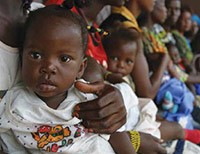
Welcome
PRH Connect serves as your comprehensive guide to the latest news and developments in the many issues affecting USAID programming in family planning and reproductive health.
News and Updates
Costed Implementation Plans for Family Planning

With USAID support, the Health Policy Project worked with various partners [PDF, 1.5MB], including the Ouagadougou Partnership and Bill & Melinda Gates Foundation, to develop a 10-step approach to creating costed implementation plans (CIPs) for family planning that align with ongoing government planning and coordination efforts. CIPs have been designed to achieve the goals of a national family planning program over a set number of years. These 10 steps will result in a consensus-driven strategy, roadmap and budget for achieving family planning goals under the Ouagadougou Partnership, FP2020 and other national programs. To date, the following countries have completed CIPs for family planning: Senegal, Burkina Faso, Niger, Togo, Mauritania, Guinea and Zambia.
- Download the brief Costed Implementation Plans for Family Planning [PDF, 910KB]
- View Senegal’s National Family Planning Action Plan 2012-2015 [French, PDF, 3.0 MB]
- View Burkina Faso’s National Plan for Family Planning 2013 - 2015 [French, PDF, 647KB]
Joint Consensus Statement of Postabortion Family Planning
USAID joined the International Federation of Gynecology and Obstetrics, the International Confederation of Midwives, the International Council of Nurses, White Ribbon Alliance, the UK’s Department for International Development and Bill & Melinda Gates Foundation in issuing a joint consensus statement on the importance of family planning service provision to women when they are treated for postabortion complications.
- Read the statement on post abortion family planning [PDF, 835KB]
2013 Statement from the Bellagio Group on LARCs
USAID joined other members of the Bellagio Group in calling on global and national family planning communities to expand access to highly effective, long-acting, reversible contraception (LARC) for women and adolescent girls within the full range of contraceptive choice, and provides recommendations for achieving these goals.
- Read the statement from the Bellagio Group on LARCs [PDF, 621KB]
Family Planning in Eastern Europe and Eurasia: A Legacy Of Change

USAID invested in family planning and reproductive health programs in Eastern Europe and Eurasia to increase access to and use of comprehensive family planning information, contraception and services and to reduce reliance on abortion. Today, family planning counseling and services are now more widely available, and the quality of services has significantly improved. Abortion rates have fallen by more than half in many countries in the region, while modern contraceptive prevalence has increased. A paper is available for download that describes USAID’s contributions to family planning and reproductive health in Eastern Europe and Eurasia, focusing on experiences in Albania, Armenia, Azerbaijan, Georgia, Romania, Russia and Ukraine.
- Download Family Planning in Eastern Europe and Eurasia: A Legacy Of Change [PDF, 4.7MB]
PROGRESS End-of-Project Report
USAID’s Program Research for Strengthening Services (PROGRESS) project improved access to family planning methods and services among underserved populations in developing countries through research, research utilization and capacity building. The PROGRESS End-of-Project Report summarizes PROGRESS successes and contributions to meeting the family planning needs of underserved populations.
- Learn more about the PROGRESS End-of-Project Report [PDF, 2.1MB]
- Watch a video of Dr. Maggwa Baker, PROGRESS director, provide an overview of the project
New Awards
The Expanding Effective Contraceptive Options Project
USAID awarded the Expanding Effective Contraceptive Options project to WomanCare Global, in partnership with Evofem, Population Services International, Everyone Mobile and the International Center for Research on Women. The goal of the project is to produce roadmaps to advance the introduction of five new woman-initiated vaginal contraceptive products.
- Learn more about the cooperative agreement with the Expanding Effective Contraceptive Options project
The Contraceptive Rings Project

USAID awarded the Family of Contraceptive Rings project to the Population Council with the goal of expanding the availability of the progesterone vaginal ring and completing development of the new 1-year contraceptive vaginal ring.
- Learn more about the cooperative agreement with the Family of Contraceptive Rings project
The EVIDENCE Project
In October, USAID awarded a cooperative agreement to the Strengthening Family Planning/Reproductive Health Programming through Implementation Science (EVIDENCE) project, which will be led by the Population Council in collaboration with a consortium of partners. The partners include Management Sciences for Health, PATH, Population Reference Bureau, International Planned Parenthood Federation and INDEPTH Network. EVIDENCE focuses on generating, translating and using evidence to strengthen and scale up evidence-based family planning and reproductive health services in PRH priority countries.
- Learn more about the cooperative agreement with the EVIDENCE project
The FACT Project
Georgetown’s Institute for Reproductive Health received an award of $19.8 million from USAID for a 5-year project on fertility awareness and family planning in sub-Saharan Africa and South Asia. FACT (Fertility Awareness for Community Transformation) is a research, intervention and technical assistance project that will test two primary hypotheses: 1) Improved fertility awareness among women and men increases the use of family planning; and 2) Expanding the availability of fertility awareness-based methods increases family planning uptake.
- Learn more about the cooperative agreement with the FACT project
Resources
- New HIP Brief: mHealth: Mobile Technology to Strengthen Family Planning Programs
- Family Planning Worldwide 2013 Data Sheet [PDF, 2.4MB]
- DHS Spatial Data Repository
Publications & Research
- Preference for Sayana® Press Versus Intramuscular Depo-Provera among HIV-Positive Women in Rakai, Uganda: A Randomized Crossover Trial
- Female Genital Cutting: The Interpretation of Recent DHS Data [PDF, 1.4MB]
- Mobile Money for Health: [PDF, 668KB]
- Costing The Standard Days Method [PDF, 1.0MB]
- Profiles and Experiences of Women Undergoing Genital Fistula Repair: Findings from Five Countries
- Improving the Efficiency, Effectiveness and Sustainability of Health Worker In-Service Training: Closing the Gaps between Evidence, Practice and Outcomes
Recent Blogs and Success Stories
- How Data Drives Decisions at USAID
- New Evidence on Child Marriage Prevention in Ethiopia
- Critical Mass? How the Mobile Revolution Could Help End Gender-Based Violence
- Transforming Gender Norms and Ending Child Marriage: The Role of Boys
- Achieving Equity through Women in Leadership
- What Does It Take to Get Contraceptives to Clients in Rural Nigeria?
- Family Planning Improves and Saves Lives
- Inspiration for a Change
- “Macho Talks” Get Men Invested in Family Health
If you have questions or comments, please contact Jane Silcock at jsilcock@usaid.gov.
To ensure delivery of this newsletter to your inbox, please add prhconnect@ksmgh.org to your e-mail address book or safe senders list.
Subscribe | Unsubscribe | Change Your E-mail | Privacy Policy
Subscribe
Subscribe to PRH Connect to get updates on the latest developments in family planning and reproductive health. View the most recent edition.
Follow USAID Global Health on Social Media:








Comment
Make a general inquiry or suggest an improvement.